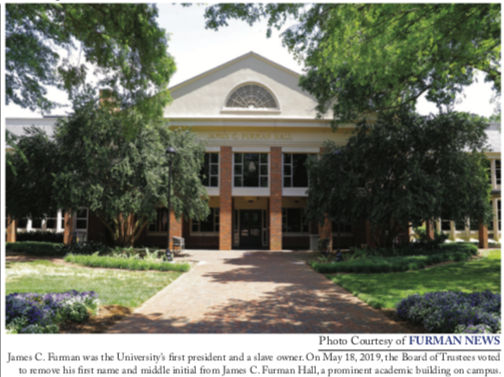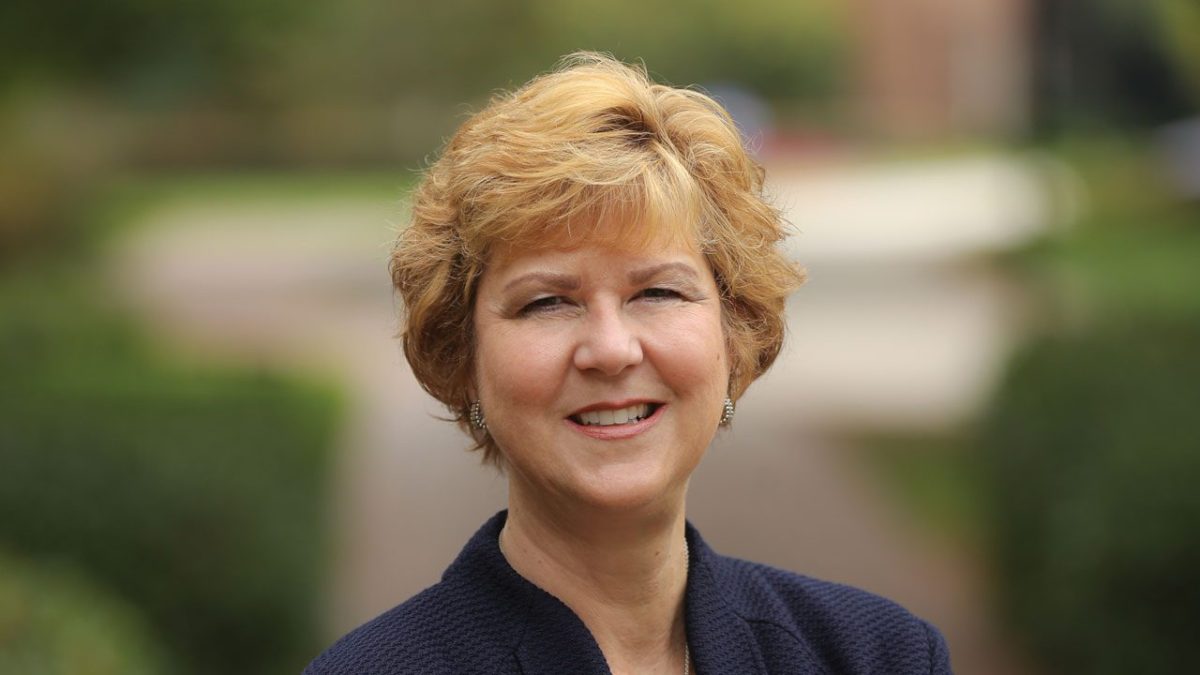On May 18, 2019 the Board of Trustees voted unanimously to change the name of James C. Furman Hall to Furman Hall. The board’s Special Committee on Slavery and Justice recommended this subtle but significant symbolic change. During President Davis’ announcement of the change in May 2019, she emphasized her confidence that the combined efforts of students, faculty, and staff, could make Furman “a stronger community than when we began.”
James C. Furman served as the university’s first president. According to an article published by the Greenville Journal, he “was a slave owner and ardent secessionist.’’ This portion of his legacy is in clear contradiction with Furman’s current goal of creating an inclusive community that takes responsibility for its difficult past, which especially affects black community members. According to Deborah Allen, Director of the Center for Inclusive Communities, “students, faculty, and staff have shared how painful it is to walk on Furman’s campus and engage with effigies, portraits, and other figures in the image of those who actively participated in exclusionary and inhumane practices. I personally have reflected on what it feels like to not see yourself represented in the landscape of campus.”
In 2017, when Provost Dr. George Shields commissioned the Task Force on Slavery and Justice, Furman took an important step towards addressing its original sins by having critical conversations about their lasting and systemic impact. Since then, many individuals and groups in all departments on campus have opened their eyes to some of the most shameful realities of Furman’s past. Allen explained, “This was something important for us to do as we think about our legacy and the principles we hold as a liberal arts institution.” Allen stressed that this was a major priority on campus and said that she was “happy to see how quickly our senior administration and the trustees moved these recommendations forward, and was honored to be a part of that announcement in May.”
Officials chose to keep the name Furman Hall, rather than completely scrap the building’s official title, James
C. Furman Hall, in order to honor and celebrate the positive aspects of Furman’s community. In other words, the removal of only James C. from Furman Hall’s official name allows the cumulative value of Furman’s history as an educational institution to shine through while simultaneously removing a daily reminder of Furman’s dark past. According to Allen, “There is much to celebrate about the Furman name.” For that reason, she explained, Furman Hall’s new name “honors and celebrates the entire Furman family and all of the students, faculty, staff and alumni who have spent time here and helped the university become what it is today.”
Although the Task Force on Slavery and Justice was a key component in creating a space for discussion about Furman’s history, it did not act alone. Baxter Wynn, a trustee and chair member of the Board’s Special Committee on Slavery and Justice, notes that the trustees “met with members of the task force as well as internal and external experts.” They aimed to create an environment open to diverse opinions in order to make significant change.
Together, these efforts combined to produce the Seeking Abraham Report, a study that includes data, historical information, student perspectives, and more. Although the study is quite comprehensive at sixty three pages, Director Allen does not think the work is complete. “I believe there are plans to update the report as more information has been discovered since its release,” she said.
Encouragingly, there was little to no resistance to the decision to change James C. Furman Hall’s name from the student body. Moreover, the decision made a serious impact on some students. An African-American student, for example, shared that “changes like this, that may seem small and insignificant, actually have an impact on me and other Black students on campus by allowing us to feel like someone out there has our backs and best interests in mind.”
Other students did not feel the change was particularly important, explaining, “it was never referred to as James C. Furman Hall; we typically only call it Furman Hall anyways. I do not see this change as significant because it will not be acknowledged on a daily basis.”
When considering the mixed responses from students, it seems unlikely that Furman will significantly improve institutional inclusivity by one simple name change. However, Allen looks to the future saying, “My hope is that we will continue the work we have begun, dedicating ourselves to becoming a more inclusive, equitable and just community.”
The Furman Hall rededication ceremony was set to occur Feb. 20, but was delayed due to inclement weather. The university plans to announce a new date for the ceremony soon.



























